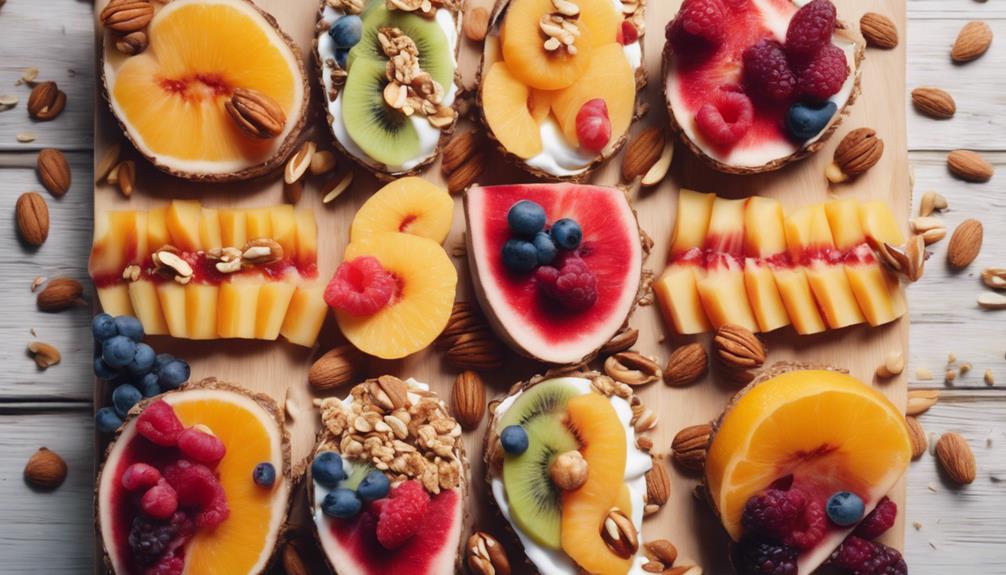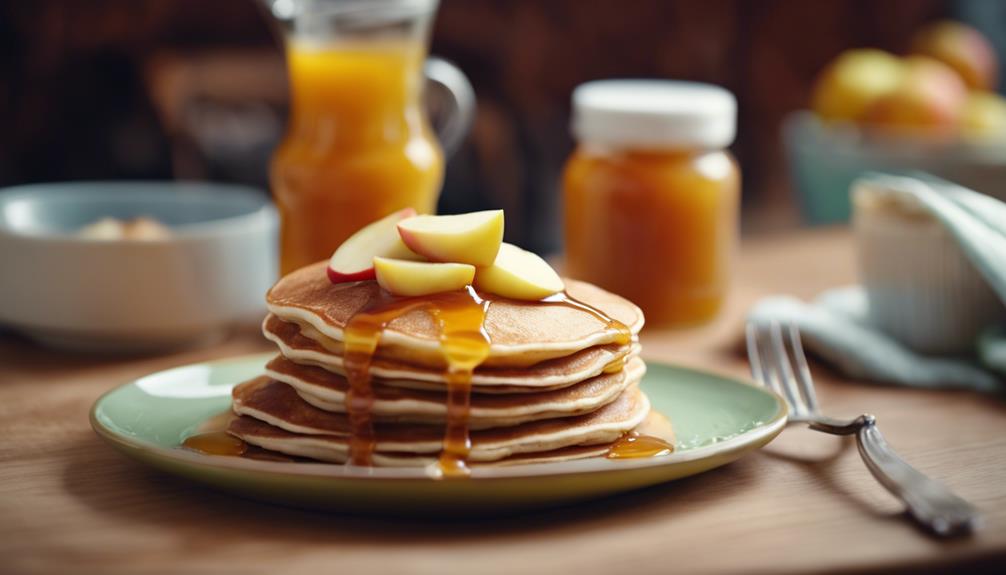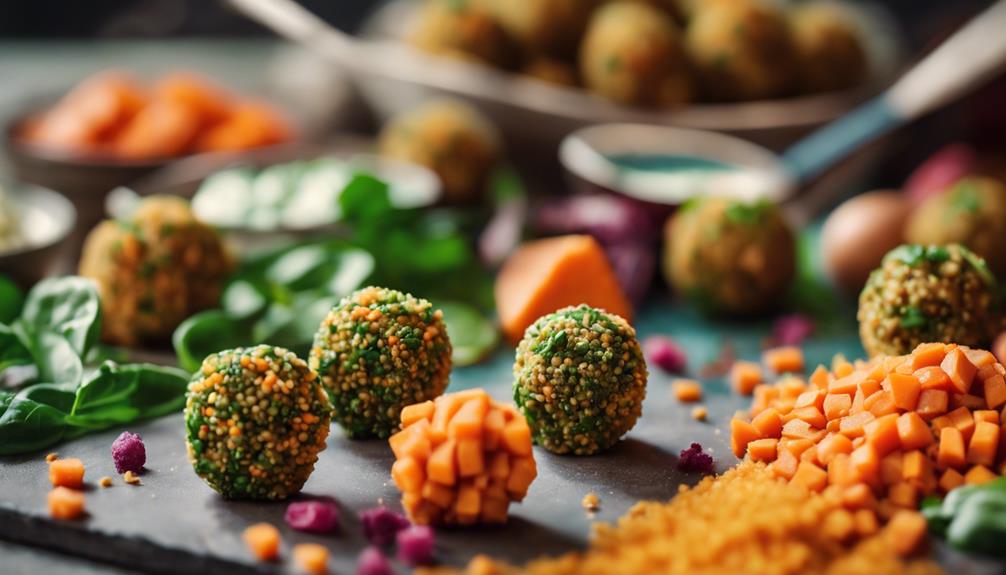Pea puree is a nutritious and simple first food for your baby. It's packed with protein, fiber, and vitamins for healthy growth. Making it is easy – just boil peas, blend, and adjust consistency. Store extras in the fridge or freezer for convenience. Try mixing peas with yogurt or oatmeal for more flavors. Each 4-ounce serving contains essential nutrients to support your baby's development. Pea puree sets a strong foundation for a healthy diet. Enhance your baby's nutrient intake with this wholesome food!
Key Takeaways
- Pea puree is rich in essential nutrients like fiber, iron, and vitamins for healthy growth.
- Easy to make by boiling frozen peas and blending for a smooth consistency.
- Introduce early to develop a taste for vegetables and support a diverse diet.
- Homemade pea puree can be stored in the fridge for 3-4 days or frozen for up to 3 months.
- Combine with yogurt, oatmeal, or smoothies for exciting flavor variations.
Benefits of Pea Puree
Discover the numerous benefits of pea puree as a nutritious choice for your baby's first food. Peas are packed with essential nutrients like protein, fiber, vitamins, and iron, vital for your baby's development. The protein content in pea puree supports healthy growth, while the fiber aids in maintaining a well-functioning digestive system for your little one.
Not only do peas provide a good source of plant-based protein, but they also offer a variety of vitamins such as A, K, and C, along with minerals like iron and phosphorus.
Introducing pea puree early on can help your baby develop a taste for vegetables, setting the stage for a diverse and healthy diet in the future.
Making Pea Puree
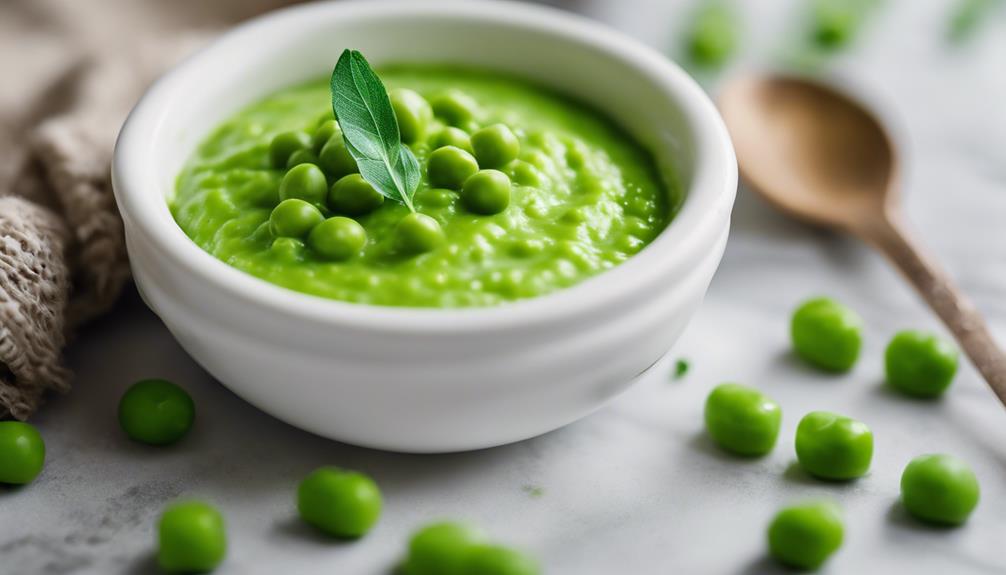
Creating pea puree for your baby is a straightforward process that guarantees they receive essential nutrients in a smooth and easily digestible form.
Start by boiling frozen peas until soft, then transfer them to a blender or food processor. Blend the peas until you achieve a smooth puree consistency.
If needed, adjust the thickness by adding water, breast milk, or formula to reach the desired texture for your baby.
This homemade pea puree is nutrient-rich and can be conveniently stored.
You can keep it in the fridge for 3-4 days or freeze it for up to 3 months using ice cube trays for portion control.
For added flavor and healthy fats, consider mixing in ingredients like avocado, olive oil, or butter to enhance the nutritional profile of the puree.
Baby Food Combinations With Peas
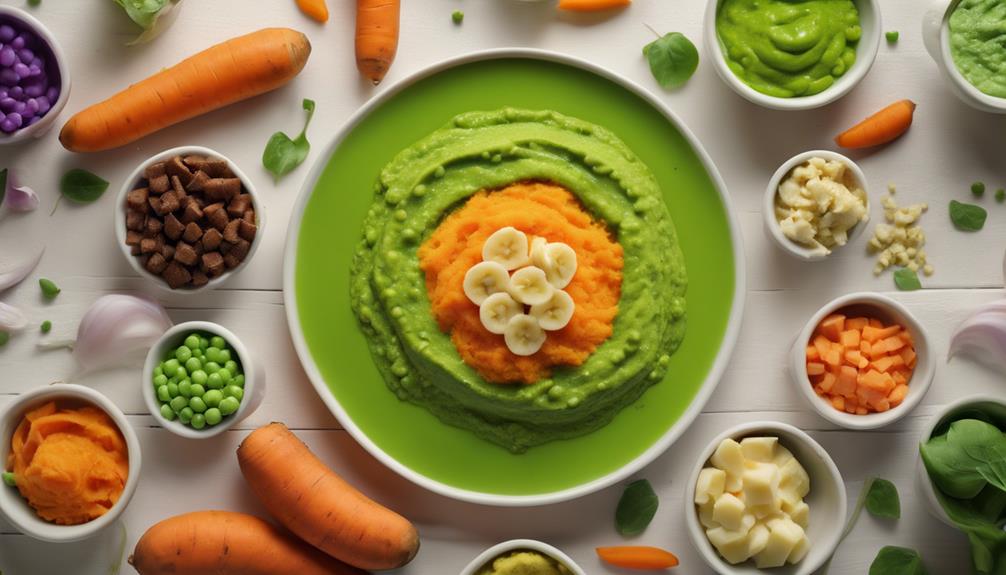
Wondering how to enhance your baby's meals with the nutritious goodness of peas? When it comes to homemade baby food, incorporating peas into various baby food combinations can introduce exciting flavors and provide essential nutrients for your little one.
Consider trying combinations like peas and mint, zucchini, peas, lentils, or apple, spinach, and peas to offer a diverse range of tastes and textures in your baby's diet. These creative baby food recipes can help your baby explore different flavors while benefiting from the nutritional value of peas.
For first foods, pairing peas with other ingredients such as yogurt, oatmeal, or smoothies can add variety to your baby's meals, making the eating experience more enjoyable. By combining peas with green veggies, orange veggies, dairy, legumes, fruits, grains, and seasonings, you can create balanced and flavorful meals that support your baby's growth and development.
Remember to offer appropriate serving sizes, around 4 ounces, to ensure a satisfying meal for your little one. Experimenting with pea baby food combinations can help your baby develop a diverse palate and establish healthy eating habits early on.
Storage and Nutrition Information
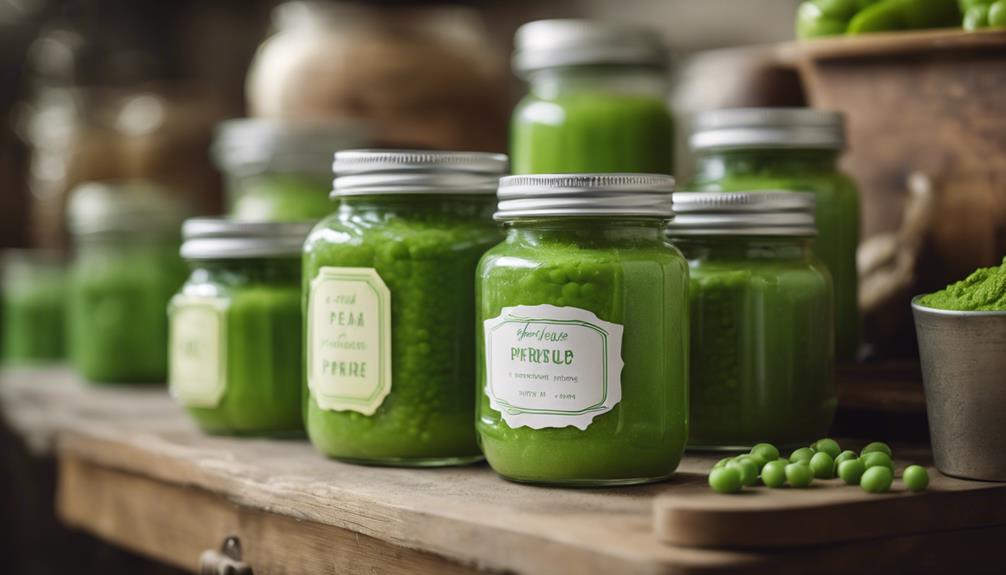
You should be aware of how to store pea puree properly and its nutritional value for your baby. Remember to keep the puree in the fridge for 3-4 days or freeze it for up to 3 months.
Each serving contains:
- 70kcal
- 12g carbohydrates
- 5g protein
- 1g fat
- 105mg sodium.
Storage Guidelines
To maintain freshness and quality, store pea puree in the fridge for 3-4 days or freeze it for up to 3 months.
When storing pea puree, consider the following guidelines:
- Fridge Storage: Place pea puree in an airtight container in the refrigerator to preserve its taste and nutrients for 3-4 days.
- Freezing: For longer storage, freeze pea puree in ice cube trays or freezer-safe containers. This method allows you to thaw individual portions as needed.
- Serving Size: Each serving of pea puree provides around 70 calories, 12g of carbohydrates, 5g of protein, and 1g of fat, offering a well-rounded nutritional profile for your baby.
- Consistency Tips: Adjust pea puree's consistency by mixing in breast milk or formula. Optionally, strain the puree for a smoother texture, making it easier for your little one to enjoy.
Nutritional Content
Enhancing the nutritional value of pea puree can be achieved by adjusting its consistency with breast milk or formula. Each serving of pea puree contains approximately 70 calories, 12g of carbohydrates, 5g of protein, and 1g of fat. The fiber content in pea puree is 4g, while the sugar content is about 6g per serving. Straining the pea puree is optional and can result in a smoother texture for baby's consumption.
Here is a breakdown of the nutritional content of pea puree per serving:
| Nutrient | Amount |
|---|---|
| Calories | 70 |
| Carbohydrates | 12g |
| Protein | 5g |
| Fat | 1g |
| Fiber | 4g |
| Sugar | 6g |
Remember to store pea puree in the fridge for 3-4 days or freeze for up to 3 months to maintain its freshness. Adjusting the consistency with breast milk or formula can help tailor the puree to your baby's needs.
Equipment and Additional Info
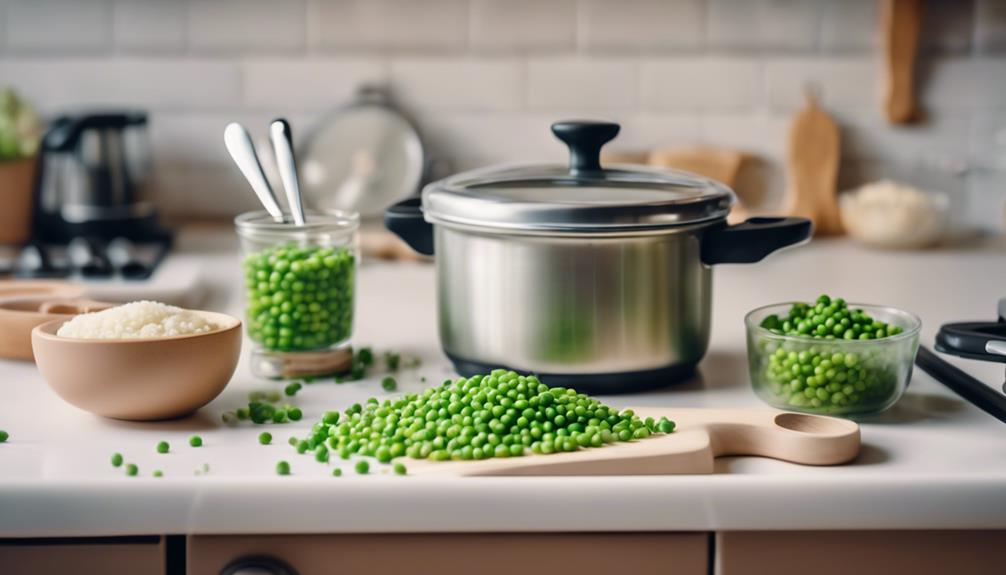
Consider utilizing a food processor and blender to achieve the best consistency when preparing pea baby puree. These tools will help guarantee a smooth and creamy texture that's ideal for your little one's first food adventure.
Here are some additional tips and information:
- Microwave Cooking: Microwave cooking can be a convenient alternative to traditional steaming methods when preparing pea puree. It can help save time while still preserving the nutritional value of the peas.
- Recipe Creator: The pea puree recipe was developed by Brittany Mullins, a health coach specializing in creating nutritious and family-friendly dishes. Her expertise assures that the pea puree isn't only tasty but also packed with essential nutrients for your baby.
- User Feedback: Positive user feedback has been received for this pea puree recipe, indicating that babies enjoy the taste and parents appreciate the simplicity of the preparation process.
- High-Protein Meal Plans: The pea baby puree is part of high-protein meal plans designed to support your baby's growth and development. It offers a nutritious option to introduce proteins into your baby's diet.
Pea Baby Puree Recipe and Benefits
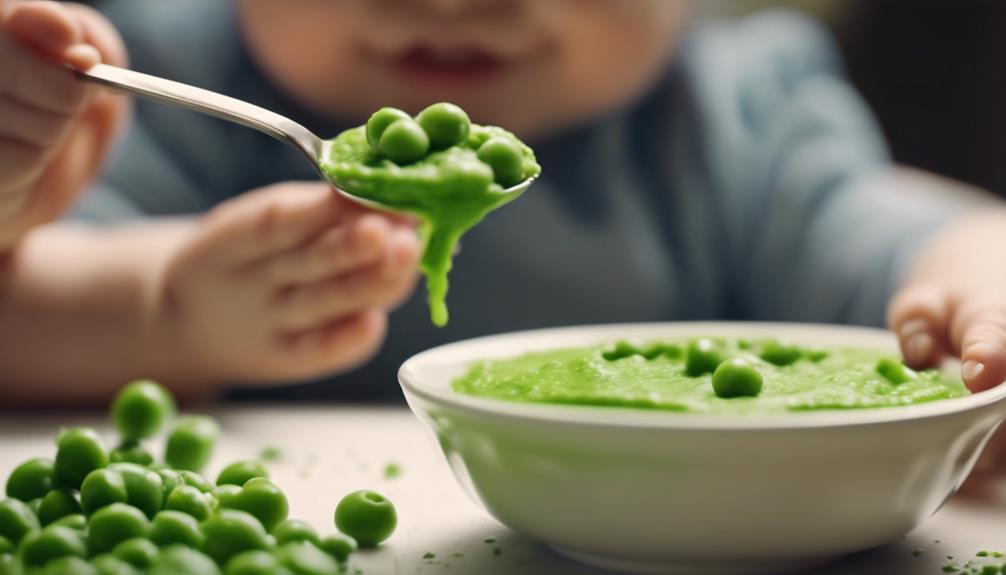
You'll love how nutrient-rich pea puree can benefit your baby's health in so many ways.
From promoting healthy digestion to providing essential vitamins and minerals, this homemade baby food is a fantastic choice.
Discover the amazing benefits of incorporating pea puree into your little one's diet.
Nutrient-Rich Pea Puree
Pea puree offers a nutrient-rich option for introducing solid foods to your baby, packed with essential vitamins and minerals like fiber, folate, and vitamins A, C, and K. Here are some key facts about nutrient-rich pea puree:
- Enhanced Taste and Nutrition: Adding zucchini to pea puree not only enhances the taste and texture but also provides additional nutrients.
- Digestive Benefits: Mint in pea puree can aid digestion and soothe upset stomachs, making it a beneficial addition to the recipe.
- Protein and Antioxidants: Peas are a good source of protein and antioxidants, promoting healthy digestion and potentially protecting against cancer.
- Safe First Food: Babies can typically start eating pea puree around 4-6 months of age, as it's a common first food that isn't a common allergen.
Benefits for Baby's Health
To maximize the health benefits of pea puree for your baby, consider incorporating a variety of nutrient-rich ingredients into the recipe. Peas are packed with fiber, folate, and vitamins A, C, and K, making pea puree an excellent first food choice for babies.
By adding zucchini to the mix, you not only enhance the taste but also introduce extra nutrients and a creamier texture to the puree. The protein content in peas aids in your baby's growth, while the antioxidants present offer various health benefits.
Additionally, the inclusion of mint can help in soothing upset stomachs and improving digestion, making it a valuable addition to your baby's diet. As pea puree isn't a common allergen, it serves as a safe and nutritious option for your little one's early food experiences, providing essential nutrients for healthy development.
Introducing this nutrient-dense puree early on can set a strong foundation for your baby's health and well-being.
Frequently Asked Questions
Are Peas a Good First Food for Babies?
Peas are an excellent first food for babies. They provide essential nutrients, help develop a taste for veggies, and are easy to digest. Your little one may pull faces, but these tiny green powerhouses support growth and development.
What Is the First Food to Puree for Babies?
When starting to puree baby food, think green! Peas make a fantastic first food. They're packed with fiber, vitamins, and protein to help your little one grow strong. Plus, homemade pea puree lets you control what goes in!
How to Make Puree of Canned Peas for Baby Food?
To make canned pea puree for baby food, drain and rinse the peas. Puree until smooth, adjusting consistency with breast milk, formula, or water. Store leftovers in airtight containers in the fridge for up to 2 days.
What Are the Benefits of Pea Puree?
For your baby, pea puree is a powerhouse of nutrients. Packed with 4g of protein per half cup, it promotes healthy digestion and provides essential vitamins and minerals for growth. Introduce this nutritious first food today!
Conclusion
So go ahead and give your little one the nutritious and delicious pea puree they deserve. With its soft texture and mild flavor, this simple first food won't only introduce them to a variety of nutrients but also help them develop a healthy palate.
Your baby will love exploring new flavors, and you'll love knowing you're nourishing their growing body with every bite.
Happy feeding!

